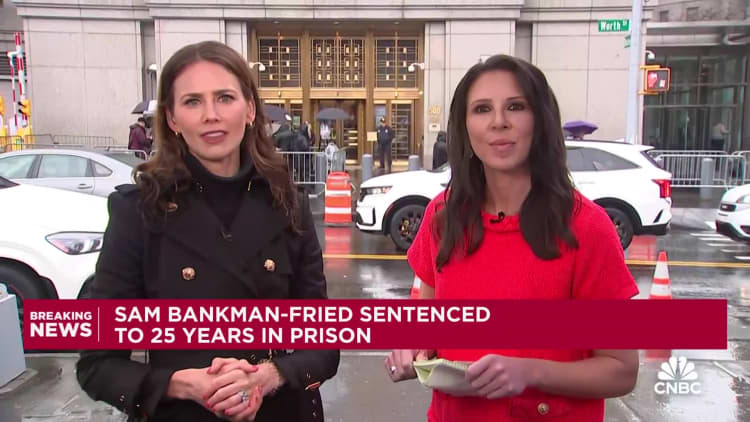Founder of left-wing party La France Insoumise (LFI) Jean-Luc Melenchon reacts during the election night of left-wing party La France Insoumise (LFI) following the first results of the second round of France’s legislative election at La Rotonde Stalingrad in Paris on July 7, 2024.
Sameer Al-doumy | Afp | Getty Images
France’s left-wing New Popular Front coalition on Sunday unexpectedly thwarted a far-right advance, clinching the largest number of seats but falling short of an absolute majority in a parliamentary run-off vote, early data showed.
The New Popular Front — an alliance of five parties ranging from the far-left France Unbowed to the Socialists and the Ecologists — could secure between 180 and 215 seats in the latest electoral round, according to an IFOP estimate for French broadcaster TV 1. Ipsos projected a lead of between 172 to 192 seats for the faction.
French President Emmanuel Macron’s Ensemble party and its allies were set to gain between 150 and 180 seats, according to IFOP, while far-right Rassemblement National — which won the first round of elections and was widely seen as likely to retain a strong momentum in the runoff vote — seen in third place with 120-150 seats.
None of the parties have accrued the necessary absolute majority of 289 seats to rule alone, suggesting markets could open on Monday to a hung parliament in Europe’s third-largest economy, if the Sunday results are confirmed.
Prime Minister Gabriel Attal, part of Macron’s Ensemble party, on Sunday stated his intentions to step down, following the results. “Faithful to the Republican tradition and in accordance with my principles, tomorrow morning I will submit my resignation to the president of the Republic,” Attal said, according to a CNBC translation.
“I know that, in light of the results of this evening, many French people feel a certain uncertainty about the future, as no absolute majority has emerged [in parliament]. Our country is experiencing an unprecedented political situation,” Attal added.

Ludovic Subran, chief economist at Allianz, told CNBC on Sunday that “France rejected the extreme right, [and] now needs to peel off the … leftist part and build center left for tomorrow to reassure markets.”
An initial ballot last Sunday suggested RN would become the largest party in France’s National Assembly but, in the last week, factions on the center-right and left joined forces to try to block its advance, withdrawing candidates in many constituencies where another candidate was better placed to beat the far-right party.
By offering voters a starker choice and fewer candidates, RN’s opponents hoped that the electorate would choose the non-RN candidate. The move appears to have worked, with anti-RN voters galvanized into action. Turnout in the second ballot was a higher 67.1%, the highest since 1997, pollster Ipsos said.
“The chief of state must bow and admit this defeat. The prime minister must leave,” Jean-Luc Melenchon, leader of the France Unbowed party, said in a CNBC-translated social media update after the release of the early poll data. “Mr. Macron must call on the NFP to govern. It is prepared to apply its agenda all of its agenda, nothing but its agenda.”
He added that the party had “tirelessly” fought Macron’s policies for the past seven years.
“We refuse any combination with the presidential camp,” Melenchon said, in a separate CNBC-translated post.
Melenchon has become a figurehead of the NFP, although the alliance does not have an official leader. France Unbowed is viewed as the biggest party in the bloc although the party’s far-left stance has dented its appeal among some center-left voters.
A period of horse-trading and instability is now likely to take hold in France, as political alliances are forged with the aim of forming a government, but it’s unclear to what extent President Macron will be willing to work with the left-wing alliance.

The country finds itself in unchartered waters: President Macron shocked Europe’s political establishment by calling the snap after his Renaissance party was trounced by National Rally in the EU Parliament elections in June. Political analysts said Macron’s move was an extreme gamble, with the president betting that French citizens would fear and ultimately reject the prospect of a far-right government. The final round of the election shows that voters, ultimately, have rejected Macron.
Macron is currently reviewing the latest election results and will await a full picture of the vote to emerge in parliament before deciding on next steps, the French presidency said on Sunday, according to Reuters.
Speaking after the release of exit poll projections, RN leader Jordan Bardella decried that the “alliance of dishonor” between Macron and Melenchon now “throw France in the arms of the extreme left,” according to a CNBC translation.
“Rassemblement National is now more than ever the only alternative facing the single party which extends, this evening, from [far-left politician] Philippe Poutou to [former French Prime Minister] Edouard Philippe,” Bardella added.
Referencing the strategies of rival parties to block the RN advance, the far-right party’s figurehead Marine Le Pen said in the wake of the projections that “this dam against nature has worked to the great despair of the French people,” according to a CNBC translation.
— CNBC’s Helen Eggleton contributed to this article.
Credit: Source link














